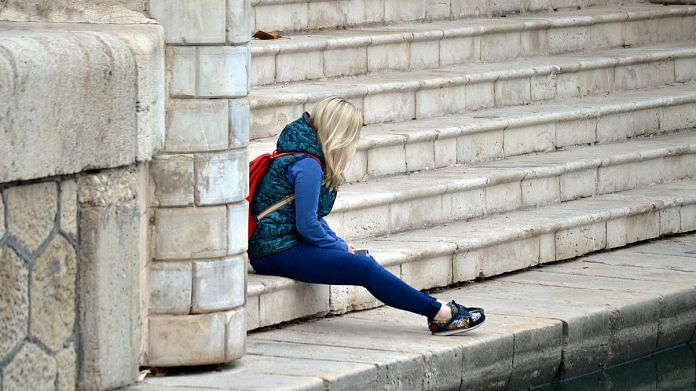Imagine a condition so bad for your health, it reduces your life expectancy as much as smoking 15 cigarettes a day. It weakens your immune system and carries an increased risk of dementia and heart disease. It even causes your wounds to heal more slowly and hurts your ability to recover from cancer.
There is one: loneliness.
I mention the physical health effects of loneliness because, in the face of a pandemic whose deadliness is as obvious as the refrigerated trucks parked outside hospitals, the world seems to have decided that people — especially younger people — who feel lonely right now are selfish, weak, entitled or simply bored. The Greatest Generation survived the Great Depression and fought World War II, after all, and today’s youth are merely being asked to binge on Netflix.
This glib comparison, a favorite jest of late-night comics, ignores the fact that connection is one of humanity’s most fundamental and basic needs. And while phone calls and video chats can keep people in touch, they’re not the same as getting together. Nor can people support one other quite as fully via technology. Videoconferencing doesn’t let you babysit children or help a friend move.
There’s been lots of sympathy for lonely elders during the pandemic. Without diminishing their suffering, it’s worth asking: Can’t this same empathy be extended to lonely young people? Smooth skin and a full head of hair don’t lessen the pangs of isolation.
On the contrary, young people may feel even worse than their elders; surveys conducted before the pandemic found the highest rates of loneliness among the young and the lowest among people over the age of 72.
Younger people report higher rates of anxiety and depression as well, and the pandemic hasn’t changed that. In July, 47% of people under 30 reported feeling anxious, according to data published by the CDC, and that percentage drops steadily with age. Only 13% of people 80 and above reported symptoms of anxiety. Undergrad and graduate students are often able to access affordable mental health care through their colleges, but closing schools has made those resources harder to access.
Working people in their 20s have been more likely than older people to be laid off than older workers this spring. One in four workers under 25 have lost their jobs, and 13% of those aged 25 to 34. That has left them without not just health benefits, but also the sense of purpose and structure a job provides.
Work provides an important social scene for younger people. In general, people in their 20s are more likely than older people to value socializing and to make new friends, but this is especially true at work, where they form more personal bonds and say that such friendships improve their performance.
People under 35 are also less settled at home, generally living with family, roommates or an unmarried partner. Thinking back to my own 20s, a single year could involve all of these options. Friends provided the only ballast in a life of ever-changing roommates, boyfriends and jobs. A pandemic would have rendered my 20s life unrecognizable.
That’s not the case now that I’m closer to the middle of life than its beginning. In fact, the age group perhaps least likely to be lonely right now is the 35-64 cohort — the most likely to be employed and the most likely to be living with a spouse, according to Census Bureau data.
Older folks may be better equipped to cope with isolation and more resilient in the face of adversity. The human brain changes throughout life, and people with older brains report higher levels of contentment and satisfaction, and are better at seeing things in perspective and concentrating. They’re better able to focus on the positive, less reactive to criticism and more accurate when it comes to reading other people’s feelings. The intense highs and lows of youth — the angst and agita — give way to the equanimity of maturity.
Those over 65 are more likely to live alone, which is a risk for loneliness. On the other hand, they’ve got practice at being on their own. Some retirees I’ve talked to say that the pandemic has barely changed their lives at all.
So, I’d like to see a little more understanding directed at the young. Shame discourages people from seeking treatment and it encourages them to lie about whether they’ve been exposed to Covid-19, making it harder to test and trace. If we don’t want people in their 20s going to bars, we should shut down bars — not reopen them and then yell at whose who show up.
Public policy to control Covid-19 cannot rely on shaming or harassing people into compliance. Yes, some young people could be doing a better job of social distancing. But understand that, for them, it’s probably harder. –Bloomberg
Also read: Thriving in coronavirus isolation depends on your personality traits



